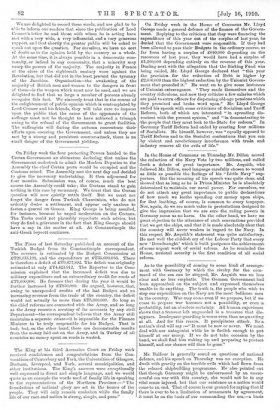In the House of Commons on Thursday Mr. Dillon moved
the reduction of the Navy Vote by two millions, and called forth a debate of great importance. Mr. Asquith, who followed Mr. Dillon, used language carefully chosen to wound as little as possible the feelings of his "Little Navy" sup- porters. But the meaning of his speech was quite clear, and showed that as long as he is Prime Minister he is absolutely determined to maintain our naval power. For ourselires, we do not attach any great importance to public declarations of how much we loathe spending our money upon ships, for that loathing, of course, is common to every taxpayer. Nor, again, do we see much value in protestations designed to give the impression that we are sure the ruling powers in Germany mean us no harm. On the other hand, we have no great objection to the utterance of such conventions provided net we get the ships, and that it is made absolutely clear that the country will never weaken in regard to the Navy. In this respect Mr. Asquith's statement was quite satisfactory. He met well the childish cry of the Labour Party that every new Dreadnought' which is built postpones the achievement of some urgent work of social reform. As he reminded the House, national security is the first condition of all social reform.






































 Previous page
Previous page